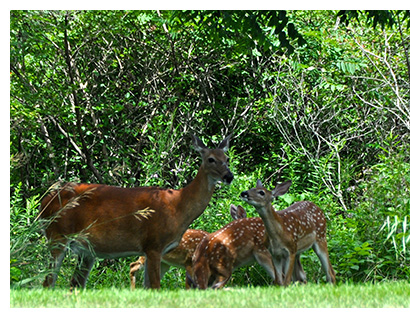|
Oh, deer!
Wednesday, July 15, 2015
By: Wendy Welch
What can we do to manage deer nonviolently?
Deer are often seen as beautiful and gentle creatures until conflicts arise with local residents, motorists and gardeners. Owed in great part to suburban sprawl which has presented a sudden and drastic loss of wildlife habitat combined with the ample food supply in our communities, "city deer" have become a growing phenomenon across the United States. People who have been affected are asking for help.
In response, city officials in Ann Arbor, Michigan have recommended a deer cull which would contract sharpshooters to kill deer every winter season, starting in January 2016.
Though data reveals that area deer-related vehicle accidents have decreased over the past six years, and no Lyme disease cases have been reported in Washtenaw county this year (and no Lyme disease transmission has been documented in Washtenaw County), some remain concerned about the deer population and their effects on gardens and landscaping. What can we do?
- Adjust your plants to make them appeal to you, not to deer. The Lady Bird Johnson Wildflower Center has an online resource for finding deer-resistant plants -- you can sort by region, light requirement, soil type-- even bloom time!
- Use humane barriers. Traditional fencing, netting, chicken wire, hardware cloth and repellants let deer know what's off-limits. Need more advice? The HSUS (no relation to HSHV) has an informative webinar on making your garden deer (and woodchuck!) resistant.
- Practice safe driving. Though deer-vehicle collisions are not on the rise in Ann Arbor, safety is always important. Scan the road and look for deer eyes (they reflect your headlights). If you do see deer, slow down and wait for all of them to cross (one may start crossing, then the family typically follows). And if you can, help clear roadside brush to increase visibility.
- Keep from getting tick-ed. Black-legged ticks transmit Lyme disease, and they're transported by deer, squirrels, chipmunks and more-- including many songbirds. To keep ticks at bay, wear protective clothing and pest repellents, tuck your pants into your socks and avoid high grassy areas. And when you return indoors, immediately check for and remove ticks from yourself and your pets.
- Let city leaders know how you feel. Do you support a nonlethal approach? Are you worried about sharpshooters in the city? The proposed cull in Ann Arbor would start in January, so if you're in support of a nonviolent approach, it's important to let Ann Arbor City Council know immediately.
Many thanks to the Citizens for Safe Deer Conflict Management who published many of the tips above in this handy flyer!
|
|
|




